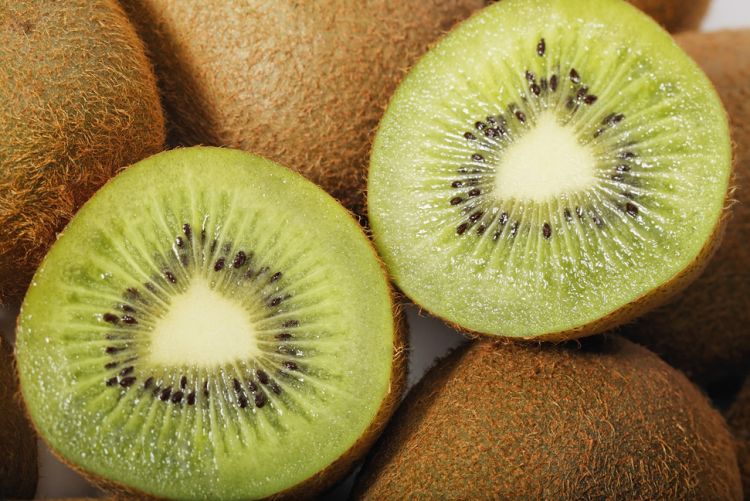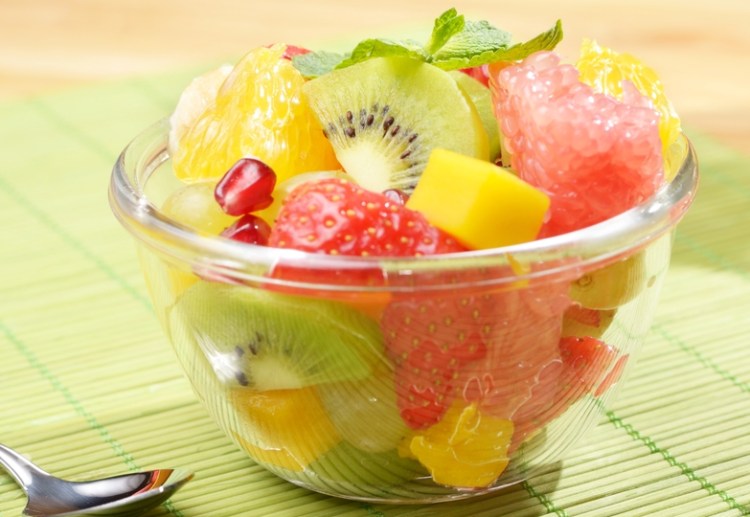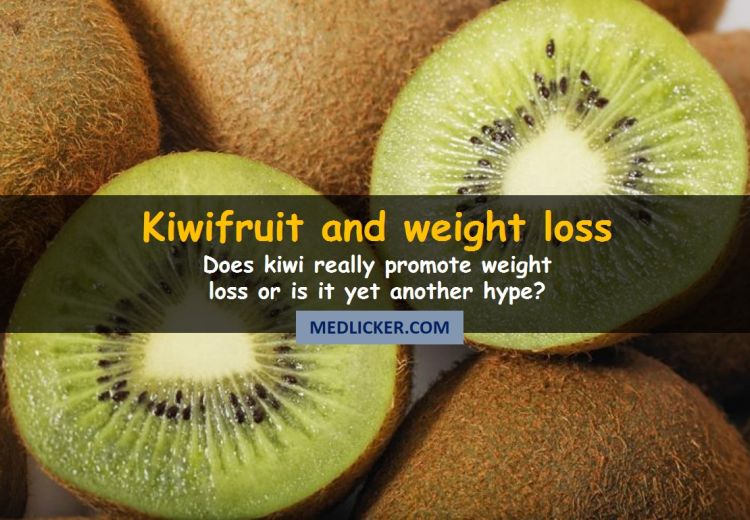Is Kiwi Really Good For Weight Loss?
Kiwi fruit is rich in weight loss friendly nutrients, such as dietary fiber, water-soluble antioxidants and vitamins. Kiwis are also low in calories and many claim that they can be particularly helpful in your weight loss efforts.
But is it true?
Does kiwi burn fat and promote weight loss or is it nonsense?
Here is a detailed, evidence-based article to answer this question.
What is kiwi fruit?
Kiwi (also called Chinese gooseberry or kiwi fruit) comes from China.
It is a fruit of various plant species from Actinidia genus.
Kiwi is an oval shaped fruit slightly bigger than a hen's egg.
This is how kiwi looks like:

Kiwi fruit is rich in weight loss promoting nutrients
It consists of a tough skin (usually green or brown) and flesh (green or gold) with lots of small, black, edible seeds.
Kiwi is soft and has a unique combination of sweet and sour taste.
It is commercially grown in New Zealand, Greece, France, California and Chile and is, therefore, available in shops throughout the year.
Kiwi nutrients
One cup (177 g) of fresh, raw kiwi fruit contains just 108 calories, which is about 5% of DV (Daily Value). Most of the calories come from carbohydrates.
Kiwi is also a rich source of dietary fiber (5.3 g or 21% of DV per a cup of kiwi).
Kiwi is also high in several essential nutrients, such as vitamins C (164 mg or 273% of DV), K (71.3 mcg or 89% of DV) and B9 (folic acid, folate) (44.2 mcg or 11% of DV).
Minerals found in kiwi, include potassium (552 mg or 16% of DV), magnesium (30.1 mg or 8% of DV), calcium (60.2 mg or 6% of DV), copper (0.2 mg or 12% of DV) and manganese (0.2 mg or 9% of DV) (1).
How may kiwi fruit help you lose weight?
Kiwi promotes weight loss in many ways. Here is a detailed overview of the most important ones.
High in fiber, but low in calories
Kiwi is rich in dietary fiber and has just a few calories.
Research shows that dietary fiber may lower your food intake (e.g. it makes you eat less by promoting the feeling of satiety) (2).
When you eat less, you also consume fewer calories, which results in weight loss (3, 4).
The exact mechanism how fiber aids weight loss are not well-known but experts suggest that fiber promotes satiety, decreases absorption of nutrients from the gut and also interacts with the secretion of gut hormones.
While the results of controlled studies are mixed, health authorities worldwide recommend increasing fiber intake by consuming more fruit and vegetables to prevent obesity as people tend not to eat enough fiber (4).
The recommended daily fiber intake (from food, not supplements) should be 25 - 30 grams (5).
However, most people consume just half of this RDV.
Eating a kiwi every day may be a good option to add more fiber (and other essential nutrients) to your diet (6).
Lowers blood triglycerides
Obesity has become a worldwide issue. It is usually associated with dyslipidemia (e.g. abnormal levels of fats in the blood).
Dyslipidemia in overweighed people usually include high blood triglycerides and LDL cholesterol and low HDL cholesterol levels (7).
Kiwi is high in polyphenols and antioxidants, which may lower lipid values.
A study on 1469 subjects showed that people who consume at least 1 kiwi per week had higher blood levels of HDL cholesterol and lower triglyceride values than those, who eat less than 1 kiwi per week (8).
Decreases insulin resistance
Insulin resistance has been associated with visceral (abdominal) fat accumulation (9).
Abdominal obesity increases the risk of cardiovascular diseases and stroke.
Regular consumption of kiwi (1 kiwi per week or more) has been shown to lower HOMA ir values (e.g. one of the markers of insulin resistance) (8).
However the decrease in HOMA ir values was not statistically significant, so take this information with a grain of salt (8).
Low glycemic index
Kiwi has a very low glycemic index (e.g. the value describing how quickly a particular food or drink increase the blood sugar level) (1).
While the role of foods with low glycemic index in weight loss is not completely understood yet, some studies actually suggest that consumption of low glycemic index foods with moderate amounts of carbohydrates is better for weight loss than eating low glycemic index foods with high amounts of fat (10).
Kiwi has a low glycemic index and contains a moderate amount of carbohydrates, which possibly makes it a weight loss friendly fruit.
Calcium may help maintain your weight
Studies suggest that consumption of dairy products and calcium rich foods may lower the dietary fat intake and help you maintain your actual weight.
However, increased intake of calcium does not result in changes in BMI (body mass index) or weight (11, 12).
Kiwi is high in calcium and its regular consumption may help you maintain your weight. have some weight loss benefits.
Folic acid
Folic acid (vitamin B9) blood levels may predict whether your obesity management efforts will be successful or not.
A prospective cohort study in 182 morbidly obese patients showed that a high serum folic acid level may be a reliable predictor of weight loss in a year to come. An increase of 1 ng/ml in blood folate increases the weight loss success by 28% (13).
On the other hand, low levels of folic acid in blood may be a signal of unhealthy eating patterns.
Kiwi is rich in folic acid and its regular consumption may increase your chance of maintaining a healthy weight.
Vitamin C promotes fat burning
Studies suggest that people with sufficient levels of vitamin C in blood burn 30% more fat while exercising than people with low vitamin C levels.
Research also shows that people, who lack vitamin C may find it very difficult (or even impossible) to lose fat mass (14).
Kiwi is one of the richest fruit sources of vitamin C.
Its regular consumption may help you maintain adequate vitamin C levels in your blood.
Aids protein digestion
Kiwifruit contains proteolytic enzymes (mainly actinidin), which helps in protein digestion (15).
Diets high in proteins may promote weight loss by increasing the feeling of fullness (satiety) and by stimulating postprandial insulin secretion (e.g. secretion of insulin after eating, which boosts your sugar metabolism and decreases the chance that it is stored as visceral fat).
Other benefits of kiwi nutrition
In addition to weight loss aid, kiwis do have some other benefits.
- Kiwi is high in antioxidants, like polyphenols, which may stimulate your immune system (16).
- Vitamin C in kiwi is a powerful antioxidant and protects your body against free radical damage. It also improves the health of your skin, because it stimulated collagen production (17).
- Kiwi also promotes respiratory health and reduces symptoms of asthma and other respiratory diseases (18).
- Kiwi promotes your eye health as it contains a carotenoid lutein and vitamin A, which are both necessary for optimum eye health (19). Lutein is also good for your skin health as it protects your body against harmful UV rays.
- Kiwi improves your sleep as it contains serotonin. This molecule also boosts your memory and acts in the prevention of depression and anxiety (20).
- Kiwi lowers the risks of osteoporosis. It is high in vitamin K, which plays an essential role in calcium metabolism and ensures that calcium is properly built in the bones to make them stronger (21).
What are the risks associated with kiwi consumption?
When ate in moderation kiwi fruit is generally safe for general population as well as for pregnant and breast-feeding women.
However kiwi fruit may interact with blood thinning medication and increase bleeding. So do not eat kiwi if you are taking blood thinners like Warfarin (Coumadin), etc. without prior consent of your physician.
Also, some people are allergic to kiwi fruit. If you experience severe itching, rash, breathing problems, sweating and any other symptoms of a possible allergic reaction after you eat a kiwi, get an immediate medical attention and stop eating kiwis.
How to buy and store kiwis?
Kiwi is available throughout the year as it is grown in countries on both hemispheres of the Earth.
You may purchase fresh kiwis on local markets or in shops.
When shopping for kiwis select the ones, that are firm and store them in a closed paper bag at a room temperature.
This actually speeds up the ripening process, which normally takes about 5 - 7 days at room temperature.
Your kiwis will be ripe when they yield to a slight pressure (check the ripeness every day!).
Ripe kiwis should be stored in a refrigerator and consumed in a week.
How to eat kiwifruit?
There are many ways you can eat kiwis.
As a rule you should never cook kiwis as any heat processing of this fruit results in significant nutrient loss.
Some of the most popular ways how to enjoy a kiwi include:
Eating a plain kiwi
Make sure you wash your kiwi first before eating it.
Then remove the raised end of the kiwi (just cut it off with a knife).
Eat kiwi flesh with a tea spoon.
Some people eat both the flesh as well as the skin of kiwifruit. We do not recommend eating the skin as it may be contaminated by pesticides.
Make a kiwi fruit salad
Peel three kiwis and slice them to small cubes.
Add 200 g of strawberries.
Peel one banana, chop it and add to the salad.

Kiwi fruit salad is a weight loss friendly food
Peel a quarter of an avocado and add to the mixture.
Enjoy this delicious and nutrient dense fruit salad.
Should you eat kiwi for weight loss?
Kiwi is a nutrient dense fruit, which may actually promote weight loss and prevent obesity or weight gain.
Studies show that thanks to its high fiber content, kiwi may promote the feeling of fullness and make you eat less calories.
It is also low in calories and improves insulin resistance and dyslipidemia (abnormal levels of fats in blood).
On the other hand you should know that if you really want to lose weight, eating kiwis alone will not help you.
You should follow a healthy variable diet and make sure you get all essential nutrients.
What is more, you should do some exercises and lead an active lifestyle in order to maintain or lose your weight.
Adding kiwis to your diet may help you prevent obesity, but in addition to kiwifruit, you should also consume a variety of other fruits and vegetables.
| Written by: | Michal Vilímovský (EN) |
|---|---|
| Education: | Physician |
| Article resources: | See numbered references in the article. |
| Image resources: | Stockphotosecrets.com |
| Published: | April 19, 2017 at 12:05 AM |
| Next scheduled update: | April 19, 2019 at 12:05 AM |
Get more articles like this in your inbox
Sign up for our daily mail and get the best evidence based health, nutrition and beauty articles on the web.


Ache in left arm that you should not ignore
Alkaline water dangers: why you should not drink it
How to Avoid Sleepiness While Studying?
23 Foods That Increase Leptin Sensitivity
Low dopamine (e.g. dopamine deficiency): causes, symptoms, diagnosis and treatment options
Swollen taste buds: the ultimate guide to causes, symptoms and treatment
Thin endometrial lining: causes, symptoms, diagnosis and treatment
Pimples inside nose: the complete guide
Holes in tonsils: definition, symptoms, treatment and prevention
How to deal with an ingrown hair cyst
Allegra vs. Zyrtec vs. Claritin
Allergy to penicillin and alternative antibiotics
How to get rid of phlegm (excessive mucus) in throat? Detailed guide to medical and home remedies, symptoms and causes
What causes stomach ache after meals?
Liver blood test results explained